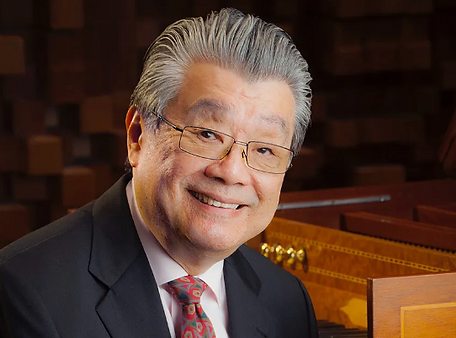
Alexander Sung

Alexander Sung has been an accomplished pianist and harpsichordist for more than 30 years.
A charismatic performer and teacher, he has won the devotion of both his audiences and students through his passionate yet genuine interpretation and style.
He began his music studies at the Mozarteum in Salzburg, Austria, under Heinz Scholz, a student of Theodor Leschetizky (Carl Czerny’s own student).
Alexander then moved to Vienna to study piano under Richard Hauser, a student of Emil von Sauer (Franz Lizst’s own student) and harpsichord under Isolde Ahlgrimm.
Alexander Sung first captured public attention in 1971 when, at age 24, he placed fifth in the International Harpsichord Competition in Brugge, Belgium.
The following year he came in fourth in the International Johann Sebastian Bach Competition in Leipzig, Germany.
After his forays in international competition, Alexander moved to United States to pursue teaching and performing.
While a professor at Virginia Commonwealth University and the University of Richmond, he delighted his audiences with his music, culminating in a 1978 performance at Carnegie Hall in New York.
In 1981, Mr. Sung was recruited by Soochow University in Taiwan to improve the quality of its music department through his unique and witty teaching style.
Since then, many music colleges throughout Asia have invited him as a guest lecturer and performer. Many of his students have gone on to lead outstanding careers as professional concert pianists and teachers.
Alexander Sung continues to flourish as a performer, mesmerizing audiences in Germany, Italy, Belgium, United States (New York, Virginia, Texas and California), Taiwan, Hong Kong, Indonesia, Malaysia, and China.
In addition to teaching and performing, Alexander released three recordings: Serenity for the Soul: Music of Bach, Pleasure for the Soul: Music of Mozart and Romance for the Soul: Music of Schubert.
Alexander plays two instruments – a 9 foot long Blüthner “Model 1” concert grand piano from Germany, which has a very round and warm tonal character with no sharpness, and a John Morley “Kirkmann” double manual harpsichord from England, which brings out the rich tones of Baroque era music.
Alexander Sung is fluent in English, German, Mandarin, and Cantonese.
